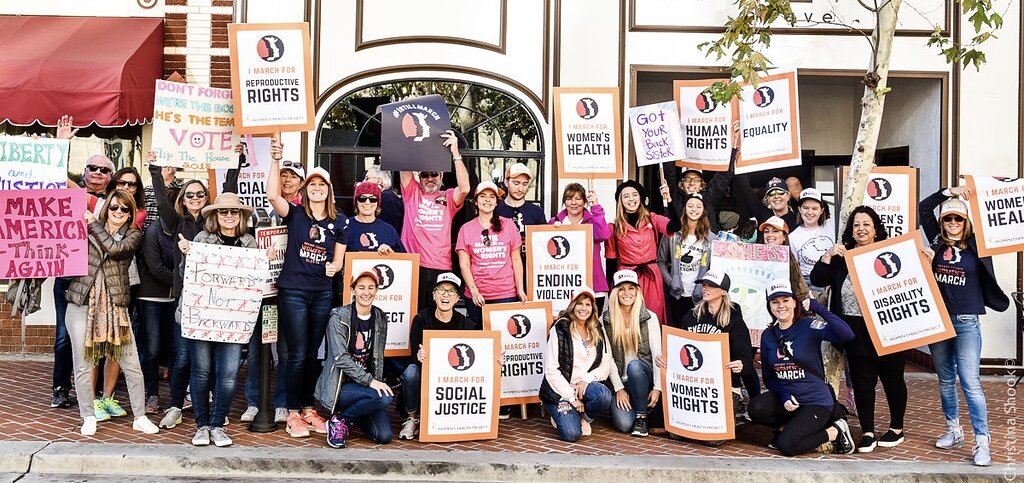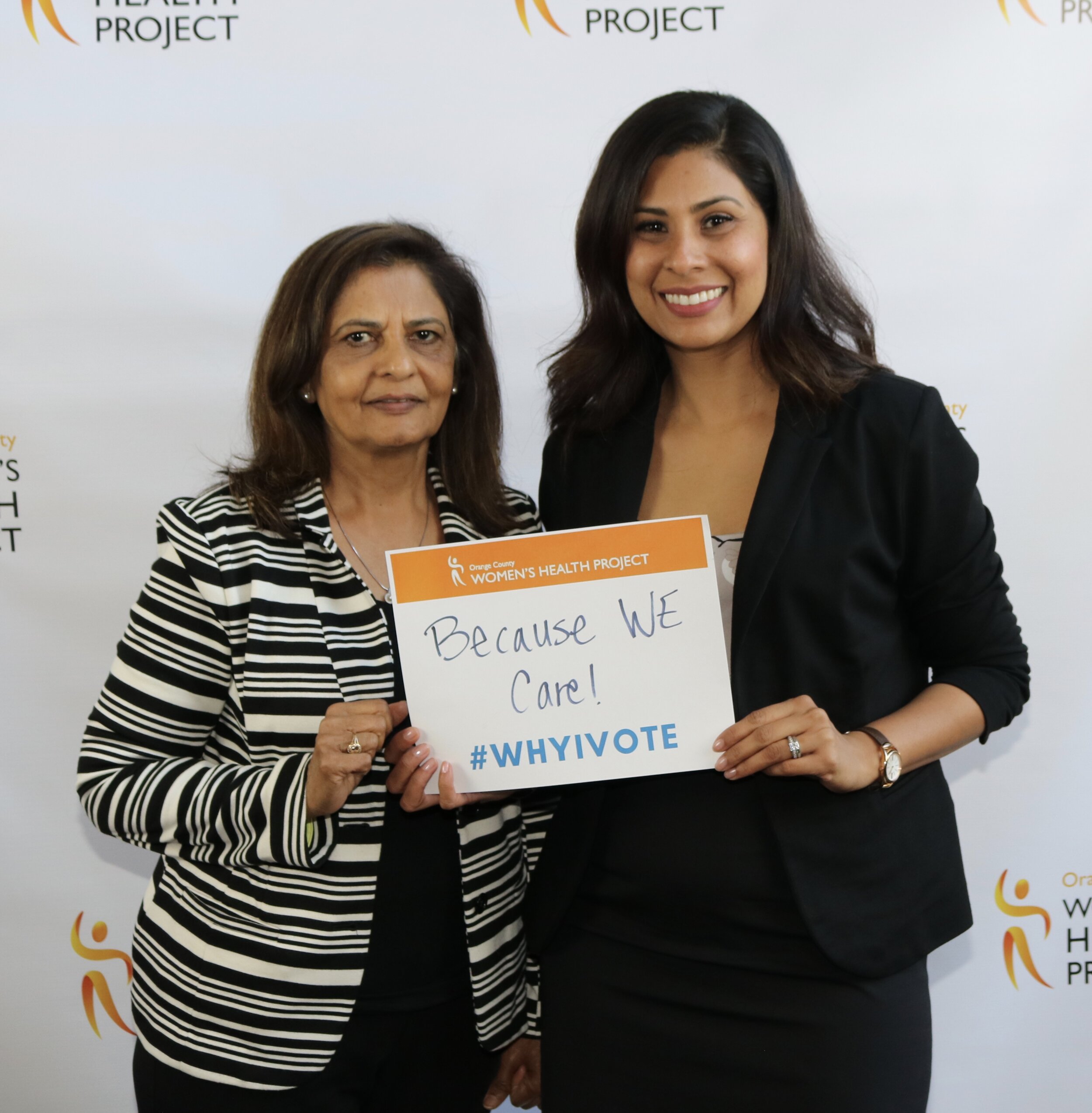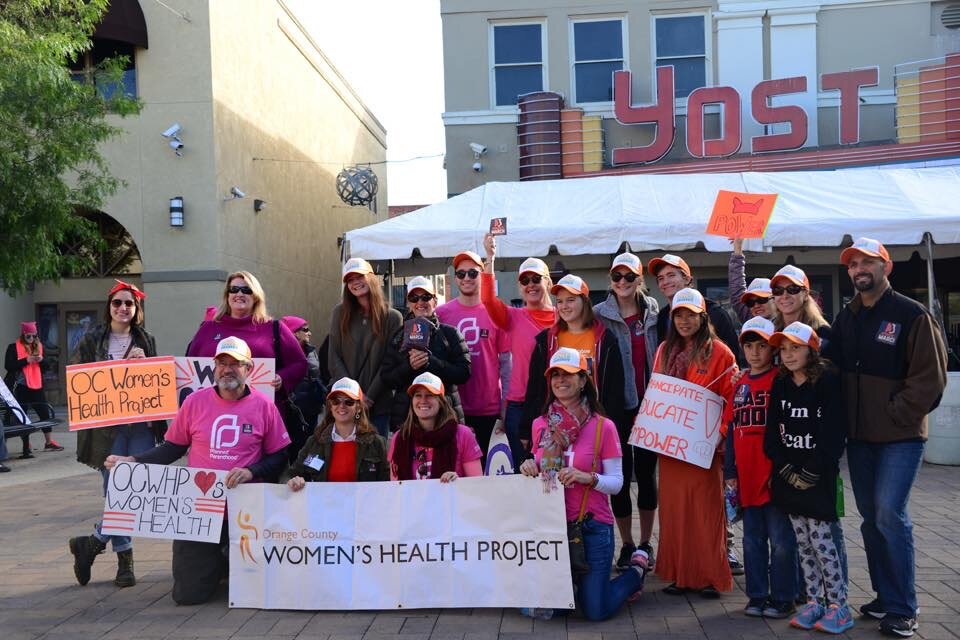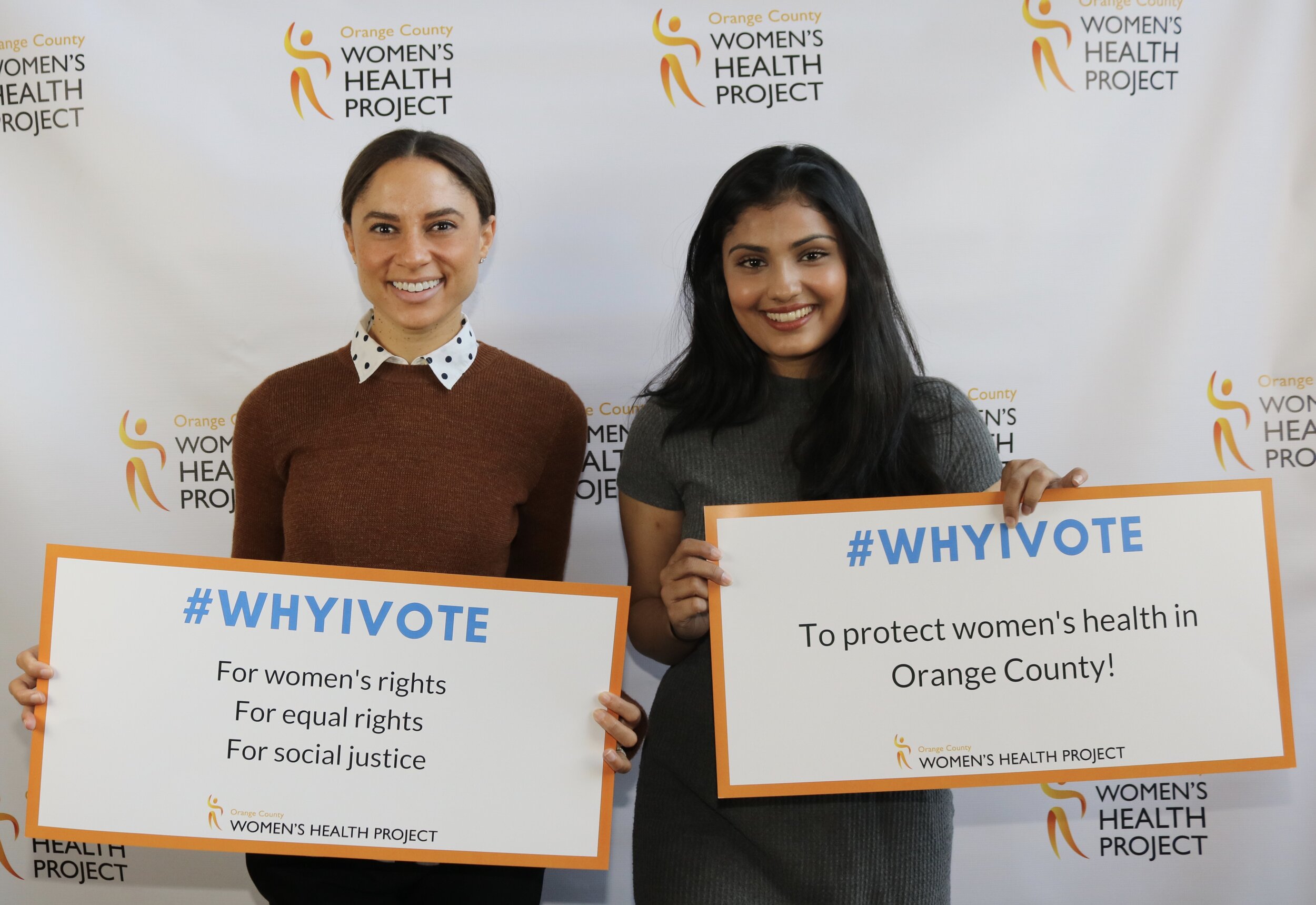The Orange County Women’s Health Project (OCWHP)
suspended operations in January 2024.
The following information is provided for archival purposes only.
Advocacy
The OCWHP seeks to drive policy change by building relationships with women’s health experts, providers, advocates, and other key stakeholders; raising awareness about women’s health issues among elected officials, funders, and other key decision-makers; providing advocacy training for nonprofit and community partners; and preparing and distributing action alerts to local residents.







2022 WOMEN’S HEALTH ADVOCACY UPDATE
June 2022. Dobbs v. Jackson Women’s Health Organization
On Friday June 24, 2022, the U.S. Supreme Court overruled Roe v. Wade ("Roe") and Planned Parenthood of Southeastern Pennsylvania v. Casey ("Casey") in a case called Dobbs v. Jackson Women’s Health Organization (“Dobbs”). In this devastating decision, the Court reversed nearly 50 years of precedent and eliminated the federal constitutional right to abortion.
While abortion is still legal in California and many other states, it is under attack across the country.
To learn the current status of abortion laws in each state, visit this Interactive Map.
To learn where to get an abortion, based on your age and gestational stage, Click Here for CA or Abortion Finder for the rest of the United States.
For more information and opportunities for advocacy, read the OCWHP’s Primer on the Dobbs decision.
2020 WOMEN’S HEALTH ADVOCACY UPDATES
CALL TO ACTION: OPPOSE NOMINATIONS TO THE SUPREME COURT OF THE UNITED STATES (SCOTUS)
October 2020
CALL YOUR SENATOR TO VOTE NO ON THE CONFIRMATION OF JUDGE AMY CONEY BARRETT TO THE SUPREME COURT
This week, the confirmation hearings for Judge Amy Coney Barrett took place in the U.S. Senate’s Judiciary Committee. The next step will be for the entire Senate to vote on whether Judge Barrett is confirmed as the Supreme Court Justice who will fill Ruth Bader Ginsberg’s seat. Her confirmation to the U.S. Supreme Court will seriously jeopardize access to women’s health, especially reproductive care and abortion.
Judge Barrett:
Believes that the Affordable Care Act is unconstitutional.
Has issued judicial opinions and signed political advertisements to overturn Roe v. Wade and end all legal abortions in the U.S.
Signed a letter describing contraception and sterilization as “objectionable” and “gravely immoral and unjust."
The Affordable Care Act has extended health insurance coverage to at least 20 million Americans, and improved access to women’s health services by providing affordable contraceptive care, requiring coverage of maternal health care, and ending the practice of denying health coverage for people with pre-existing conditions, like having had a cesarean section. The Supreme Court is scheduled to hear a case in November, shortly after the election, that could overturn the entire Affordable Care Act and eliminate all of these protections for women. Judge Barrett has publicly disagreed with past Supreme Court decisions to uphold the Affordable Care Act and signed an open letter that criticized the Affordable Care Act’s birth control benefit as an “assault on religious liberty.”
Judge Barrett would also likely overturn Roe v. Wade if a case challenging this long-standing law were heard by the Supreme Court. As a law professor, she was part of an anti-abortion-rights faculty group and in 2006, Judge Barrett signed an anti-abortion letter that accompanied a newspaper ad calling for "an end to the barbaric legacy of Roe v. Wade." Moreover, she has written judicial opinions in two abortion cases where she is clearly antagonistic to the right to an abortion – suggesting that a government may prohibit a woman from having an abortion if the government does not like her reasons, and questioning the long-standing ability of abortion providers to sue to block abortion restrictions before they go into effect. At her confirmation hearing, Judge Barrett stated that she does not consider Roe v. Wade a "super-precedent" case, meaning a legal precedent that the Supreme Court could not overrule.
Additionally, in 2012, Judge Barrett signed onto a letter* that called contraception and sterilization “gravely immoral and unjust.” She also mischaracterized emergency contraception as an “abortion-inducing drug.”
If Judge Amy Coney Barrett is confirmed to the Supreme Court, and a 6-3 conservative majority is established, then legal protections for women's health, voting rights, and other civil rights are likely to be eroded, if not overturned altogether.
Even if your Senator has already stated how they plan to vote, it is still important that they hear from you, their constituent. The more constituents that they hear from, the more your Senators know how much support/opposition they have for their vote. This confirmation vote will have repercussions for generations to come.
Please call your Senator to voice your concerns. Call the United States Capitol switchboard at (202) 224-3121 or find your Senator's contact information here.
SCOTUS UPDATES
June 2020
LITTLE SISTERS OF THE POOR SAINTS PETER AND PAUL HOME v. PENNSYLVANIA
(regulatory exemptions from contraceptive coverage mandate held constitutional)
Last week, the Supreme Court ruled in Little Sisters of the Poor Saints Peter and Paul Home v. Pennsylvania, which was consolidated with a related case, Trump v. Pennsylvania, that nearly any type of employer that has a religious or moral objection to providing health insurance coverage for contraception is exempt from doing so under the Affordable Care Act. As a result of this ruling, the U.S. Department of Health and Human Services has estimated that up to 126,000 women could lose contraceptive coverage from their employers, and cost each woman $584 annually to pay for her own contraceptive care.
By way of background, the Affordable Care Act requires all non-grandfathered employer-sponsored health plans to cover the full range of contraceptives at no cost to women. This is referred to as the contraceptive coverage mandate. The original federal regulations for this requirement exempted houses of worship (churches, temples, mosques, etc.) from the contraceptive coverage mandate. In response to multiple challenges, the Obama administration created an accommodation for religiously-affiliated nonprofit universities, hospitals, and charities, which allowed these organizations to submit a form self-certifying that they had a religious objection to providing contraceptive coverage to their employees or students, and the form triggered the insurance carrier or third party administrator to provide the coverage directly to the employee/student, without any financial or administrative involvement from the objecting employer.
In the 2014 case Burwell v. Hobby Lobby, the U.S. Supreme Court ruled that “closely held” for-profit employers had religious free exercise rights, and that the contraceptive coverage mandate substantially burdened these rights in violation of the Religious Freedom Restoration Act (RFRA). Importantly, this was the first time that the Supreme Court recognized any for-profit corporation's claim of religious belief. Subsequently, the Obama administration provided additional accommodations for nonprofit religious organizations: instead of filing a form with its insurer, any eligible organization – including for-profit closely held corporations -- could fill out a form notifying the U.S. Department of Health and Human Services (Department) of its religious objection, and the Department coordinated with the insurer, not the employer, to provide contraceptive coverage to affected employees.
After the Presidential administration changed in 2016, so did the regulations. In November 2018, the Trump administration issued new regulations that exempted not only houses of worship, but nearly any type of organization, from the contraceptive coverage mandate if it had a religious or moral objection. In addition, the regulations eliminated any written requirement that could still accommodate women to receive contraception directly from the insurer. Therefore, women were no longer guaranteed full contraceptive coverage without cost sharing if their employer asserted a religious or moral objection.
Two cases challenging these rules were combined by the Supreme Court -- Trump v. Pennsylvania and Little Sisters of the Poor v. Pennsylvania. In these cases, Pennsylvania and other states argued that since the new rules no longer guarantee contraceptive coverage for women whose employers object to covering it, those women may turn to state-funded programs to receive contraception and the states will incur additional healthcare costs due to an increase in unintended pregnancies. They also argued the Trump administration violated the Administrative Procedures Act when it issued the new regulations without proper notice.
The Supreme Court sided with the Trump administration’s new rules, finding they were issued properly. It also agreed with Little Sisters of the Poor that the accommodation crafted by the Obama Administration violates the Religious Freedom Restoration Act (RFRA) and agreed that the law permitted the Trump administration to expand the types of employers entitled to exemptions.
A Health Affairs study found that in 2013, the first year the contraceptive coverage mandate was in effect, U.S. women saved an estimated $1.4 billion on birth control pills alone and on average a woman saved $254.91 per year on the pill. What is most egregious about the Trump regulations is that they expand the exemptions to almost any type of employer and those objections can be based on not just religious, but also moral, objections. We are dismayed by this ruling and believe that employers should not be permitted to impress their personal beliefs on their employees to erode their employees’ access to basic healthcare.
JUNE MEDICAL SERVICES LLC v. RUSSO
(abortion restrictions held unconstitutional)
On June 29, the Supreme Court held that a Louisiana law which significantly restricted access to abortion is unconstitutional.
The case, June Medical Services LLC v. Russo challenged a Louisiana law that required physicians who perform abortions in the state to have “active admitting privileges” at a hospital within 30 miles of the facility where the doctor provides abortions. The Supreme Court held that this law created unnecessary health regulations that presented a substantial obstacle to women seeking abortions and therefore imposed an undue burden on the right to choose. The Court also upheld that lower court’s finding that laws requiring admitting privileges do not provide any additional health or safety benefits for women seeking abortions. Further, the Court found that if the law had been allowed to go into effect, it would have left Louisiana with just one clinic and one provider for the 1 million women of reproductive age in the state.
Interestingly, the Louisiana law in question was substantively identical to a Texas law that the Supreme Court had struck down as unconstitutional only four years ago in Whole Women’s Health v. Hellerstedt. In that 2016 case, the Supreme Court also held that a Texas law requiring providers to obtain hospital admitting privileges in order to perform abortions was an unnecessary regulation that created an undue burden on women seeking abortion care. The Court further found ample evidence in the record justifying the lower court’s finding that the law conferred virtually no health benefits to women, thus the burden that this regulation imposed on women outweighed any benefit.
Notably, Chief Justice Roberts did not vote with the majority to strike down the Texas law in Whole Women’s Health, but he reasoned in June Medical that Whole Women’s Health established a legal precedent that must be honored in this case, under a principle known as stare decisis, and cast the fifth vote concurring with the judgment.
“The legal doctrine of stare decisis requires us, absent special circumstances, to treat like cases alike,” Roberts wrote in concurring with the decision. “The Louisiana law imposes a burden on access to abortion just as severe as that imposed by the Texas law, for the same reasons. Therefore Louisiana’s law cannot stand under our precedents.”
Importantly, in his concurrence in June Medical, Roberts also noted that Whole Women’s Health and therefore June Medical should only have considered whether the law in question posed an undue burden on a women’s right to access abortion, and should not have compared that burden with the alleged health benefits (or lack thereof) of the law in question. This commentary highlights that access to abortion remains in jeopardy, and it is likely that the Supreme Court will continue to take up abortion cases over the next several years. We must therefore remain vigilant in advocating for access to all types of health care for women.
NATIONAL WOMEN'S HEALTH UPDATES
February 2020
47th ANNIVERSARY OF ROE V. WADE / ABORTION AT SCOTUS
January 22 marked the 47 year anniversary of Roe v. Wade, the landmark Supreme Court ruling that legalized abortion nationwide. This year is especially poignant, as women’s health is rapidly being jeopardized, especially when it comes to access to safe, legal abortions.
In March, the U.S. Supreme Court will hear oral argument in June Medical Services v. Gee, a challenge to a Louisiana law that requires doctors who perform abortions to have admitting privileges at a local hospital. This case is a reprise of another case decided in 2016, when the Supreme Court struck down a nearly identical Texas law as unconstitutional, in Whole Woman's Health v. Hellerstedt. In that case, the Court found the law did not improve women’s health and instead imposed an undue burden on the constitutional right to access abortion. Why would Louisiana pass a law that has already been deemed unconstitutional? Because Justice Anthony Kennedy retired after Whole Women’s Health, and Justice Kavanaugh’s appointment has cemented a more conservative Supreme Court.
Notably, in January, more than 200 Republican members of the House and Senate filed a brief urging the justices to use June Medical Services to overturn Roe once and for all. Nevertheless, multiple briefs have been filed in support of abortion access. A decision is expected by the end of June.
BIRTH CONTROL AT THE SUPREME COURT, AGAIN
In January, the Supreme Court announced that it would revisit whether employers must guarantee free birth control coverage for their employees. This marks the third time that the Supreme Court is taking up this provision. Under the Affordable Care Act, employers are required to provide birth control with no co-pays and no deductibles in all employee health plans. This is part of the women’s preventive care guidelines (see below). Houses of worship, including churches, temples and mosques, were always exempt from the requirement. However, nonprofit groups like schools and hospitals that are affiliated with religious organizations were not.
In 2014, in Burwell v. Hobby Lobby Stores, the Supreme Court ruled that requiring family-owned corporations to pay for insurance coverage for contraception violated a federal law protecting religious liberty.
In 2017, the Trump administration issued new rules that significantly expanded the number of workplaces that could opt out of the contraceptive coverage requirement. In July 2019, a federal court concluded that the administration did not follow the appropriate procedures when it issued the new rules, and that federal law does not authorize the broad exemptions described by the Trump administration’s rule. The new rules were prevented from continuing, and now the Supreme Court will decide how broadly the contraceptive exemption applies to employers.
TITLE X UPDATE
The Title X Family Planning Program is a federal grant program for low-income patients to receive family planning and reproductive health services. New regulations by the current administration that took in effect in July 2019 place unnecessary restrictions on the program, and undermine the quality of care women receive. These new rules prohibit Title X recipients from providing referrals for abortion care, even when requested by the patient, and eliminate the requirement for nondirective pregnancy options counseling that also includes discussion of abortion as an option. Beginning in March, Title X-funded centers must establish and maintain physical separation from the provision of abortion. As a result of these restrictions, in California alone more than 50% of Title X clinics have dropped out of the program.
Furthermore, the Trump regulations no longer require Title X grantees to offer all FDA-approved methods of birth control to their patients (as was required before); instead, Title X grantees are now required to provide only one FDA-approved method, and that method can be natural family planning (also known as the rhythm method or withdrawal). This means patients will experience unnecessary delays when seeking more effective methods of birth control.
The State of California and Essential Access Health, California’s largest administrator of Title X funding, have sued the administration over these regulations. A hearing is scheduled on February 20th in Federal District Court, where a motion for summary judgment has been made, which means that there is a request for the court to rule that the administration has no case, and the new regulations should not be allowed to continue. The OCWHP will continue to monitor the legal progress of the case and provide updates.
UPDATED WOMEN'S PREVENTIVE CARE GUIDELINES
Under the Affordable Care Act, Women's Preventive Services are required to be covered by all insurers with no co-pay and no deductible. In January, the federal government announced that it is adding screening for anxiety as one of these required covered services under the Women’s Preventive Services Guidelines. There are 11 other services already included under these guidelines:
Breast Cancer Screening for Average Risk Women
Breastfeeding Services and Supplies
Screening for Cervical Cancer
Contraception
Screening for Gestational Diabetes Mellitus
Screening for Human Immunodeficiency Virus Infection
Screening for Interpersonal and Domestic Violence
Counseling for Sexually Transmitted Infections
Well-Woman Preventive Visits
Screening for Diabetes Mellitus after Pregnancy
Screening for Urinary Incontinence
